As we age, our body naturally produces less collagen, the protein responsible for the skin’s strength, structure, and elasticity. The rate at which collagen declines—causing sagging, wrinkles, aged spots, and uneven skin texture—is mostly down to your skin’s DNA, according to dermatologist and skin surgeon Dr. Carole Hazan. However, lifestyle and other factors can also accelerate premature aging and make you look older than you are. “My mantra for maintaining healthy skin, aiding rejuvenation, and having a youthful appearance is to eat a well-balanced diet with lots of vitamins and antioxidants, drink plenty of water, get adequate sleep, exercise regularly, and always use sunscreen, ” says Dr. Hazan.
1. Sun And Environmental Damage
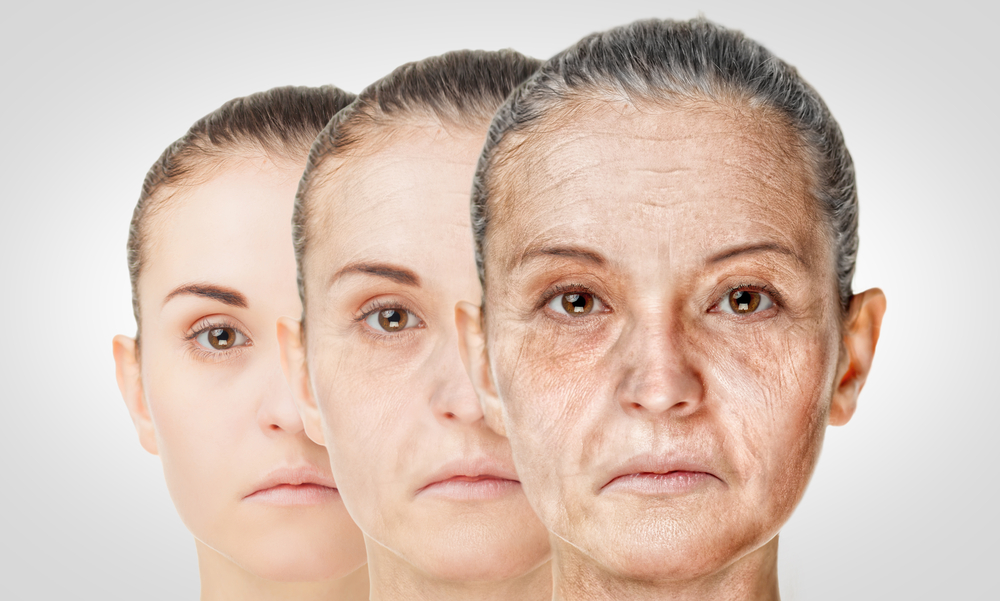
The sun’s UV rays are one of the leading causes of premature aging. Even on cloudy days, excessive sun exposure without sunscreen can cause significant damage to the skin. UV rays penetrate the skin and alter its DNA, leading to a breakdown in collagen and elastin fibers, which are crucial for maintaining the skin’s firmness and elasticity. As a result, this damage can lead to wrinkles, pigmentation, uneven skin tone, age spots, and thinning skin.
cosmetic dermatologist Dr. Hazan emphasizes the importance of protecting your skin from UV damage, with many recommending the daily use of SPF 30 or higher, regardless of whether you’re directly in the sun. Applying sunscreen regularly helps to block harmful UV rays and prevent long-term damage that accelerates the aging process. Incorporating SPF into your skincare routine is essential for maintaining healthy, youthful skin and preventing the visible effects of sun exposure.
2. Smoking Is A Skin Hazard
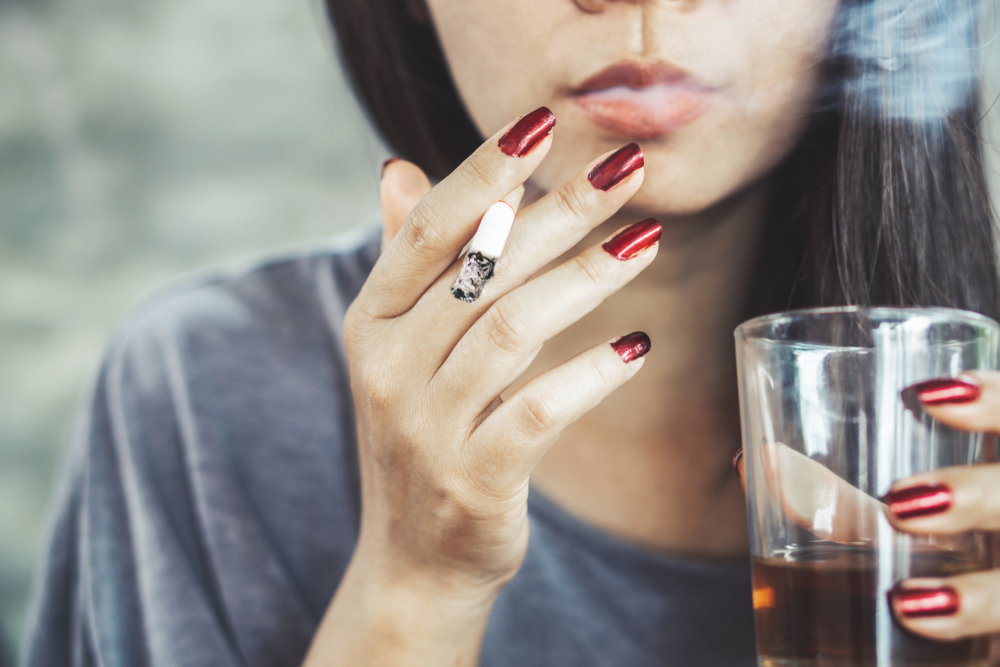
Smoking, including vaping, is a major skin hazard that accelerates the aging process. The chemicals in cigarettes and e-cigarettes increase the production of metalloproteinase, an enzyme that breaks down the skin’s collagen and elastin. These essential proteins are responsible for maintaining the skin’s firmness and elasticity, and their degradation leads to the formation of wrinkles and sagging skin. According to PubMed, smoking increases MMP levels, which degrade collagen, elastic fibers, and proteoglycans, contributing to premature skin aging.
In addition to weakening the skin’s structure, smoking also reduces blood flow to the skin cells, depriving them of vital oxygen and nutrients. This results in dehydrated skin, which can appear dull, gray, and lifeless. According to ASH, smoking constricts blood vessels near the skin’s surface, reducing oxygen and nutrient delivery. The combination of collagen breakdown and poor skin nourishment accelerates the visible signs of aging, making smoking a significant factor in premature skin aging.
3. Drinking Excess Alcohol

Drinking excessive alcohol can have a detrimental effect on the skin, accelerating the aging process. Alcohol acts as a diuretic, causing the skin to lose vital fluids and become dehydrated. This depletion of moisture leaves the skin looking dry and more prone to fine lines and wrinkles. Additionally, alcohol reduces the skin’s ability to retain essential vitamins and nutrients, contributing to premature aging.
Alcohol also triggers inflammation and increases the production of free radicals, which destroy antioxidants in the skin. These free radicals damage the skin at a cellular level, leading to further deterioration of its structure. As a result, frequent alcohol consumption can cause the skin to appear bloated, sagging, and dull, with a loss of its youthful glow. According to Bold Health, alcohol interferes with collagen production, leading to increased wrinkles and sagging. Moderating alcohol intake is crucial for maintaining healthy, vibrant skin.
4. Sunbathing And Using Tanning Beds

Sunbathing and using tanning beds may seem like an effective way to boost Vitamin D levels and improve skin health, but they come with significant risks. Tanning beds expose the skin to concentrated UV radiation, which accelerates the aging process by damaging skin cells. This excessive exposure not only leads to premature wrinkles, sagging, and pigmentation but also increases the risk of skin cancer. Despite claims that tanning beds can detoxify the body or improve circulation, the long-term damage to the skin far outweighs any temporary benefits.
According to The Skin Cancer Foundation, tanning, whether indoors or outdoors, is a sign of skin damage and increases the risk of developing basal cell carcinoma, squamous cell carcinoma, and melanoma. Additionally, overdoing it in the sauna can have negative effects on the skin as well. The intense heat dehydrates the body, which in turn impacts the skin’s moisture levels, leaving it dry and more prone to damage. The imbalance of natural electrolytes caused by excessive heat exposure can further stress the skin, making it more vulnerable to irritation and aging. Protecting the skin from overexposure to UV rays and maintaining hydration is key to keeping it healthy and youthful. As noted by Medical News Today, tanning beds can still cause sunburn, premature skin aging, and skin cancer, making them a risky choice for skin health.
5. Stress Overload

Chronic stress has a significant impact on the body, affecting it on a cellular level and accelerating the aging process. When the body is under stress, it triggers an inflammatory response, releasing stress hormones like cortisol and adrenaline. These hormones break down collagen, a key protein responsible for maintaining skin elasticity and firmness, while also damaging the chromosomes that help prevent DNA degeneration. As a result, the skin becomes more vulnerable to wrinkles, sagging, and other visible signs of aging.
In addition to its effects on collagen and DNA, prolonged stress can exacerbate various skin conditions, including eczema, rosacea, acne, and psoriasis. The stress-induced inflammation weakens the skin’s natural barrier, making it more susceptible to flare-ups and irritation. Managing stress is essential for both mental and skin health, as reducing stress levels can help prevent premature aging and improve the overall appearance of the skin.
6. Gut Imbalances

Dr. Hazan emphasizes that poor nutrition can significantly impact skin health by depriving the body of the vital nutrients and antioxidants it needs. These nutrients are essential for maintaining healthy skin and protecting it from free radical damage, which accelerates the aging process. Without proper nourishment, the skin becomes more susceptible to damage, leading to a dull, lifeless appearance and visible signs of aging.
A diet high in sugar can further exacerbate the aging process. Excessive sugar intake triggers inflammation in the body, which disrupts the natural production of collagen and elastin, two proteins essential for skin elasticity and firmness. This disruption leads to the formation of wrinkles and sagging skin, contributing to premature aging. To maintain youthful, vibrant skin, it’s important to focus on a balanced diet rich in antioxidants and nutrients that support collagen production and skin health.
7. Using Retinol A
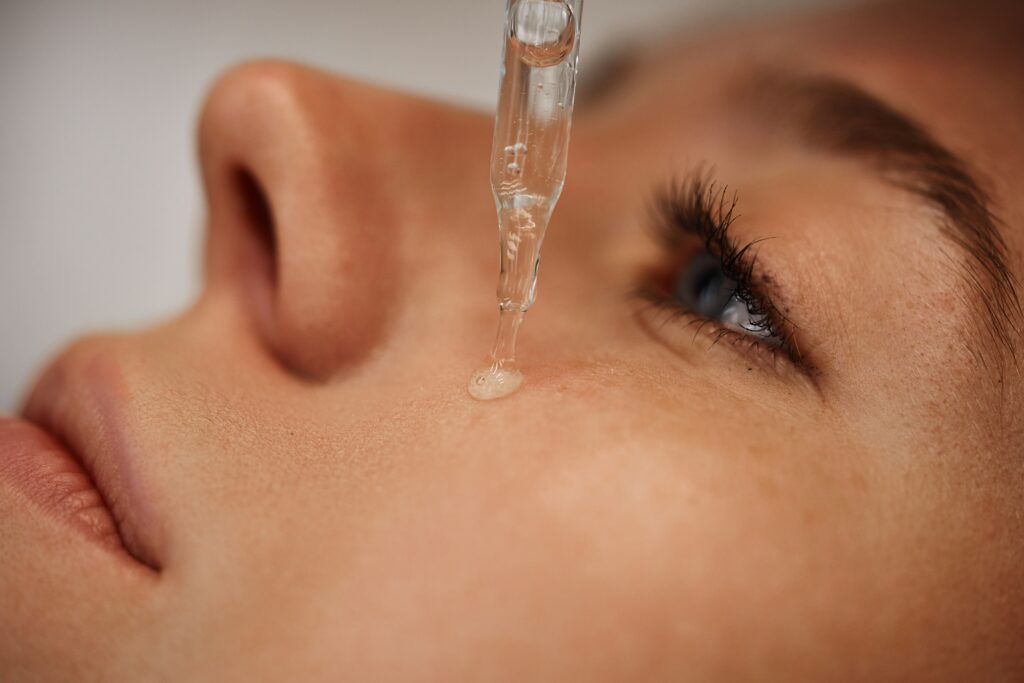
Retinol is an FDA-approved ingredient widely used for its ability to exfoliate the skin, boost collagen production, and reduce the signs of aging and acne. Its potent properties make it a powerful tool in skincare, helping to improve skin texture and reduce fine lines. However, due to its strength, retinol is not suitable for all skin types, especially those with sensitive skin. Overuse can weaken the skin’s natural barrier, leading to irritation, redness, excessive dryness, and in some cases, an older appearance as the skin becomes more fragile.
Additionally, retinol increases the skin’s sensitivity to the sun, making it more vulnerable to UV damage. Sun exposure while using retinol can accelerate the aging process, leading to wrinkles, pigmentation, and other signs of sun damage. To mitigate these risks, it’s important to use retinol carefully and combine it with adequate sun protection to maintain healthy, youthful skin while benefiting from its anti-aging effects.
8. Toxic Skincare

The skin is the body’s largest organ, and it is essential to treat it with care by using clean, non-carcinogenic skincare products free of harmful chemicals. Ingredients like synthetic fragrances, sulfates, parabens, lead, formaldehyde, and methylene glycol can be toxic to the skin, causing long-term damage. These toxic chemicals can degrade collagen and elastin, two key proteins that maintain the skin’s firmness and elasticity, leading to premature aging and the formation of wrinkles.
In addition to damaging the skin’s structural components, these ingredients can disrupt the skin’s natural barrier, making it more susceptible to irritation and inflammation. Over time, exposure to toxic chemicals can dry out the skin, causing thinning, redness, and breakouts. To protect your skin and maintain a healthy, youthful appearance, it is crucial to choose skincare products with gentle, non-toxic ingredients that nourish and support the skin’s natural functions.
9. Applying Heavy Foundation
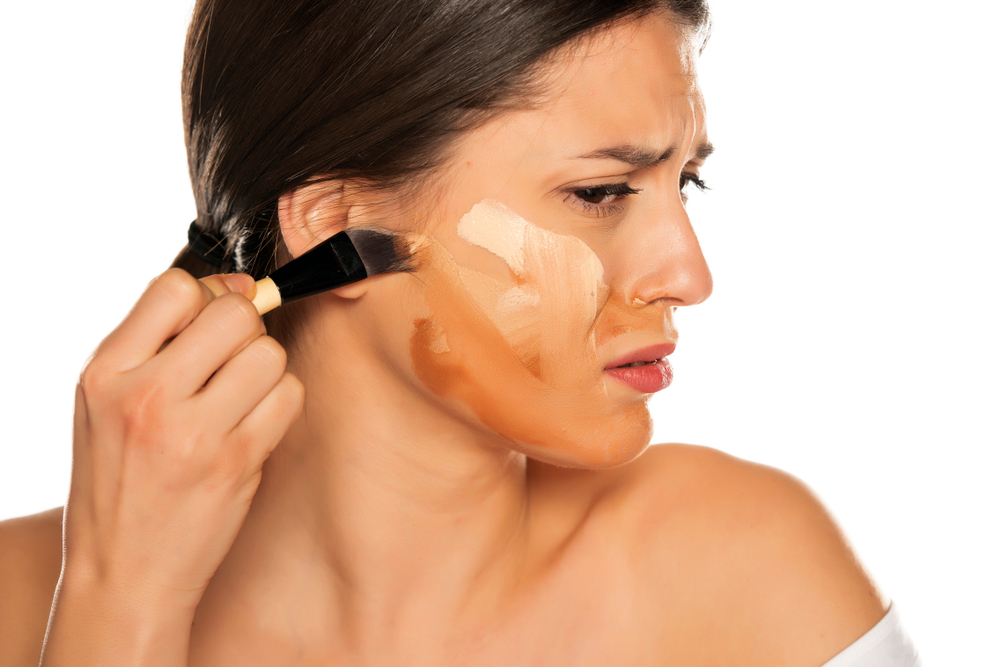
In addition to using clean skincare, it’s equally important to ensure that your makeup products are free from harmful chemicals. Many conventional makeup items contain toxic ingredients that can irritate the skin, clog pores, and contribute to premature aging. By choosing makeup that is gentle and free of harmful chemicals, you can protect your skin while still achieving a beautiful look.
As you age, it’s also essential to adapt your makeup routine to your changing skin. Makeup artist Katrina Raftery advises against using thick, cakey foundations, as they tend to settle into fine lines and wrinkles, highlighting the very signs of aging you want to minimize. Heavy matte-setting powders can have a similar effect, creating a harsher, older appearance. Instead, opt for lightweight foundations and powders that provide a more natural, dewy finish, helping to create a youthful glow while avoiding accentuating imperfections.
10. Dehydrating Your Skin
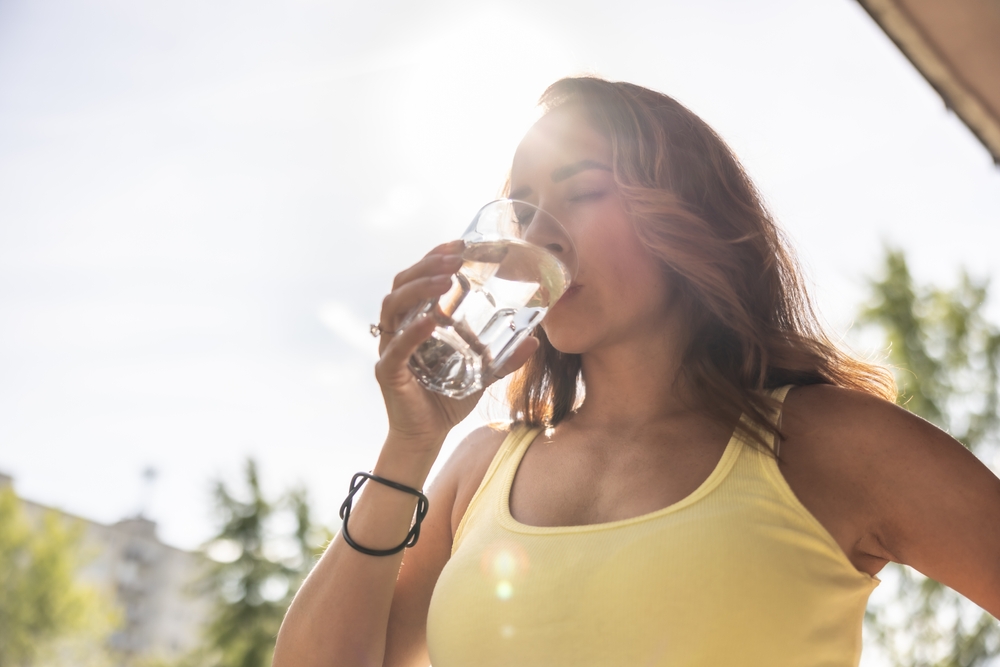
Health experts recommend that women drink 2.7 liters of water daily to maintain proper hydration for both their bodies and skin. Staying hydrated is essential for keeping the skin’s natural defenses strong, as dehydration can lead to irritation, sensitivity, and an accelerated aging process. Without sufficient water, the skin becomes less resilient, making it more prone to inflammation and dryness.
Dehydrated skin loses its healthy, radiant appearance and begins to show signs of aging more quickly. The texture of the skin can become rough, tired, and dull, with an overall older appearance. Drinking enough water helps to support the skin’s moisture levels, keeping it smooth, plump, and youthful-looking. Hydration plays a crucial role in maintaining healthy skin, so it’s important to prioritize drinking water throughout the day.
11. Over-Exercising

Exercising regularly is essential for maintaining both physical and mental health, but overdoing it, especially with extreme workouts after the age of 35, can have negative effects on your skin. Intense exercise can lead to fat and muscle loss, resulting in thinner, sunken skin, a condition often referred to as “gym face.” While exercise helps tone the body, excessive physical strain without proper rest can exacerbate the breakdown of the skin’s structure.
Over-exercising also puts stress on the body, causing oxidative stress and free radical damage. This damage weakens collagen and elastin fibers, which are responsible for keeping the skin firm and elastic. Furthermore, working out outdoors without sun protection increases exposure to UV rays, which can accelerate the aging process, leading to wrinkles and further skin damage. It’s important to balance exercise with adequate recovery time and proper sun protection to avoid these harmful effects on the skin.
12. Facial Expressions

As we age, the skin naturally loses its elasticity and firmness due to the natural aging process, and gravity plays a role in this shift. However, repeated facial expressions can accelerate this gravitational pull. Constant frowning, frequent facial movements, and even smiling can contribute to the development of fine lines, sagging skin, and droopy eyelids over time.
These repetitive expressions create creases in the skin that deepen with age, leading to more noticeable signs of aging. While expressions like smiling and frowning are natural, being mindful of them can help minimize their impact on the skin. Maintaining good skincare habits and considering treatments to counteract the effects of gravity and muscle movement can help keep your skin looking youthful for longer.
13. Cleansing Incorrectly
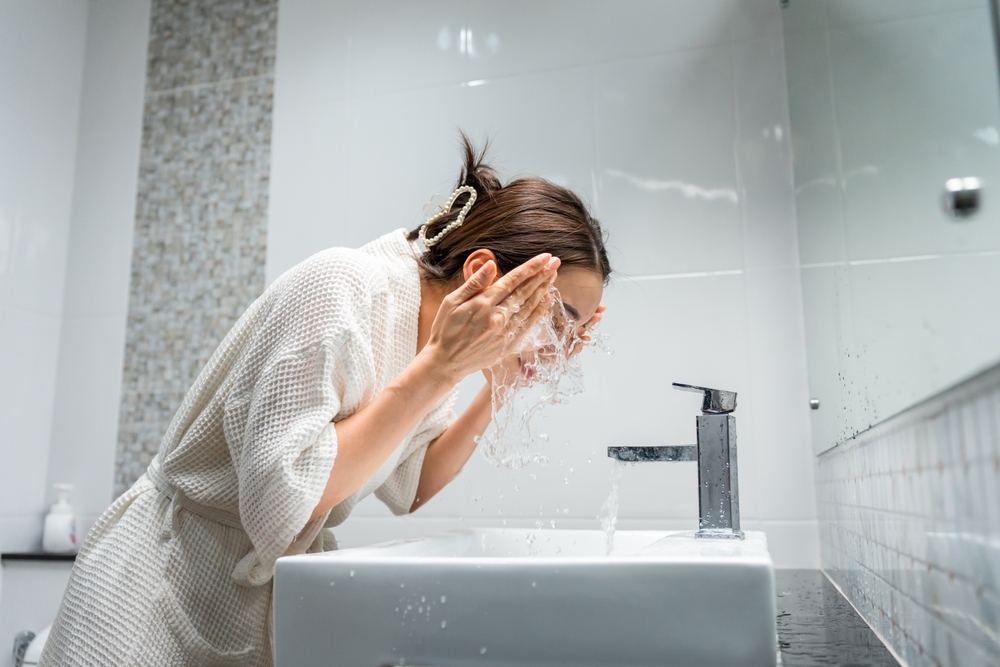
Keeping your skin clean and hydrated is essential for maintaining its health, and many beauty experts recommend a daily double cleanse to achieve this. Throughout the day, the skin is exposed to dirt, sweat, pollutants, and bacteria, which can build up and cause various issues. Failing to properly cleanse your face can leave these impurities trapped on the skin’s surface, leading to clogged pores and irritation.
According to skincare expert and holistic healer Monica Watters, inadequate cleansing can result in blemishes, skin irritation, and even collagen damage. Collagen is crucial for maintaining skin structure and elasticity, and any damage to it can trigger premature aging. To prevent these problems, it’s important to thoroughly wash your face each day, ensuring that your skin is free from debris and properly nourished.
14. Harsh Exfoliation
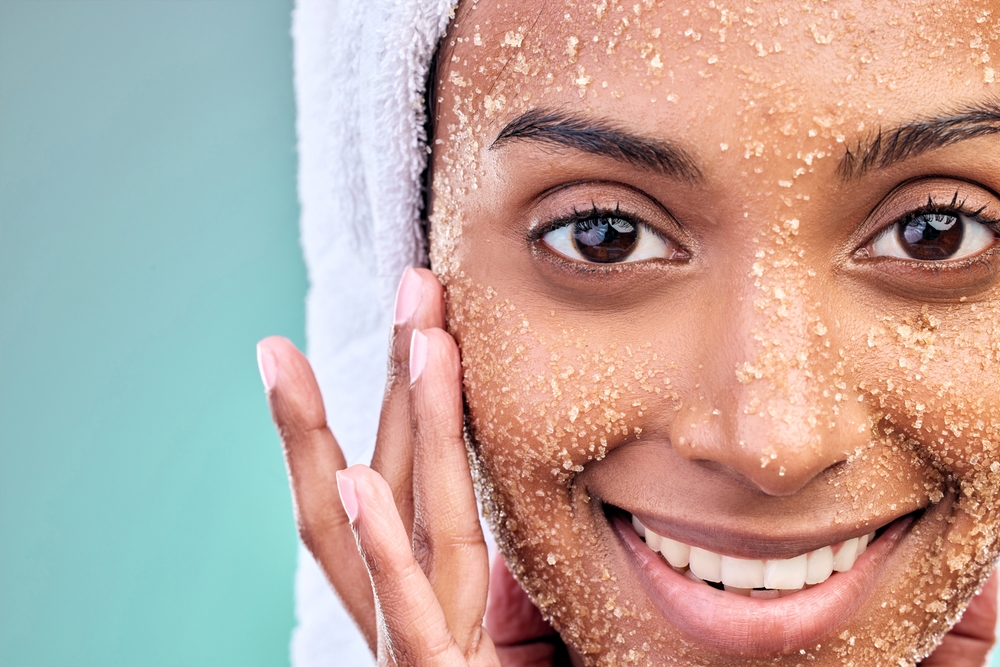
Exfoliating the skin is an important step in removing dead skin cells and allowing your skincare products to penetrate more effectively. When done correctly, it can enhance your skin’s appearance and overall health. However, over-exfoliating or using harsh, chemical-laden exfoliators can have the opposite effect. Stripping the skin of its natural oils can damage the surface, causing more harm than good.
Excessive exfoliation leads to a breakdown in collagen, which is vital for maintaining skin elasticity and firmness. This can result in dehydrated, irritated skin that is more prone to fine lines and wrinkles, accelerating the aging process. It’s important to choose gentle exfoliators and use them sparingly to preserve the skin’s protective barrier while still reaping the benefits of smoother, healthier skin.
15. Chemical Peels

Chemical peels are cosmetic treatments aimed at removing dead skin cells and damaged skin to reveal a smoother, younger-looking layer beneath. While effective at improving skin texture and appearance, chemical peels are invasive treatments that intentionally damage the skin to stimulate its natural healing process. This process can lead to a temporary rejuvenation of the skin, but it comes with risks that need to be carefully considered.
Some skincare experts caution that repeatedly wounding or damaging the skin can accelerate the aging process. This may create a cycle of constant healing and recovery, which could lead to long-term issues. The side effects of chemical peels can include lasting redness, scarring, skin discoloration, and heightened sensitivity. As with any cosmetic procedure, it’s important to weigh the potential benefits against the risks and consult with a professional before undergoing such treatments.
16. Eye Damage
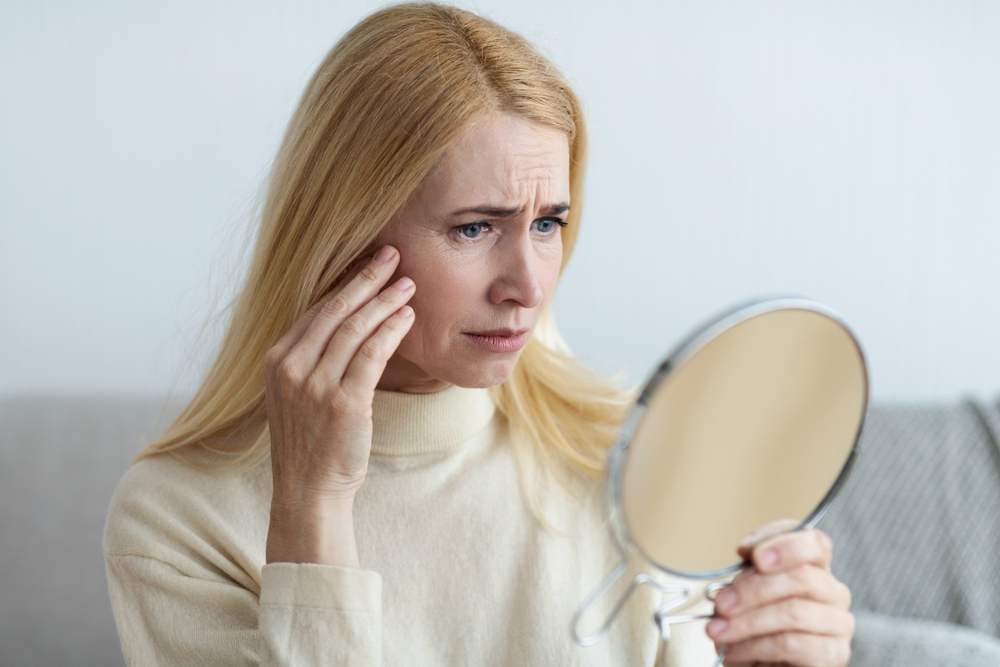
The skin around your eye area is thinner and more delicate, making it more prone to fine lines and wrinkles. If you neglect to use an eye cream, you can accelerate the signs of aging in this sensitive area. Additionally, weakening the eye muscles can result in droopy eyelids, further enhancing the appearance of aging. Everyday habits like rubbing your eyes, pulling at the skin, and excessive exposure to screens, reading, or driving can all contribute to premature aging around the eyes.
Dr. Hazan recommends looking for ingredients like Vitamin C, peptides, and hyaluronic acid when choosing eye care products. These ingredients help stimulate collagen production and improve the skin’s ability to retain moisture, which in turn smooths out fine lines and wrinkles. Moreover, environmental factors such as air conditioning and alcohol consumption can also impact the skin around the eyes, exacerbating signs of aging. Taking proactive steps to care for this delicate area can make a significant difference in maintaining youthful, refreshed eyes.
17. Sleep Disturbances

Sleep deprivation and poor-quality sleep can contribute to premature aging. When you don’t get enough rest, the body produces less collagen, which weakens the skin’s structure, elasticity, and barrier function. Collagen is essential for maintaining a youthful appearance, and a deficiency can lead to sagging or fine lines. Additionally, insufficient sleep disrupts the body’s ability to regenerate cells effectively, further accelerating the aging process.
Lack of sleep also negatively impacts immune health and increases cortisol production. Cortisol, known as the stress hormone, can damage collagen and interfere with the skin’s ability to heal. Over time, this can contribute to a dull complexion and exacerbate the visible signs of aging. Prioritizing quality sleep is crucial for maintaining healthy, youthful skin and overall well-being.
Natasha is a seasoned lifestyle journalist and editor based in New York City. Originally from Sydney, during a stellar two-decade career, she has reported on the latest lifestyle news and trends for major media brands including Elle and Grazia.


